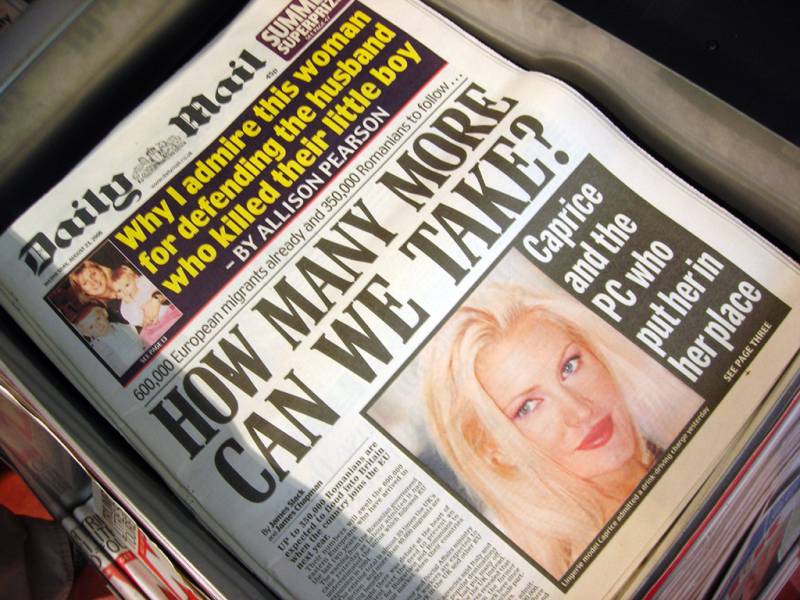After 15 years of public scandals, only 23 journalists and officials have been held criminally accountable for illegally accessing information.
For decades, British journalists have illegally accessed personal information and bribed officials, yet they remain essentially self-regulated without criminal accountability, even for behaviors that are unambiguously illegal.
In 2000, a few journalists started reporting the problem, mostly blaming unauthorized access to private telephone conversations and voicemails. From September 2002, a few newspapers (principally The Guardian) named other newspapers (the News of the World) as illegal gatherers of data.
The system of self-regulation was topped by a Press Complaints Commission, which effectively ignored or frustrated complaints by claiming a lack of evidence or powers. The British government referred complaints to the Press Complaints Commission. The Metropolitan Police (Met), which is responsible for policing London, where most British media outlets are based, was disinterested.
In November 2002, a separate regional police force invited the Information Commissioner’s Office (ICO), which is responsible for regulating the handling of personal information, to view evidence that Metropolitan Police officers and other officials had sold information from the Police National Computer and the Driver and Vehicle Licensing Agency (DVLA) databases. Subsequent ICO and police investigations identified thousands of privacy violations and implicated 305 journalists, but only four officials were prosecuted.
In January 2003, the House of Commons Committee on Culture, Media and Sport started its first investigation into journalistic abuses. The witnesses included Editor Rebekah Brooks and Deputy Editor Andy Coulson of the News of the World. Brooks absent-mindedly admitted that the newspaper routinely gathered information illegally “in the public interest,” and that it paid police officers for stories, while Coulson revealed that they would do so again “in the public interest.” The Parliamentary Committee and the Information Commissioner’s Office reported concerns about journalistic activities, but no criminal or political inquiry followed.
Unaccountable Britain
In January 2011, under a new government, the Met opened a new investigation into phone hacking, but it appeared to languish, like most others before it. Suddenly, in July 2011, Met Commissioner Sir Paul Stephenson and Assistant Commissioner John Yates both resigned. Yates had unofficially socialized with the deputy editor and other employees of the News of the World, while leading dismissive investigations — since September 2009 — into the allegations made against the News of the World. The Met announced a new investigation, Operation Elveden, into payments made to police by News International, the parent organization of the News of the World. The coalition government also announced a public inquiry into press culture, practices and ethics, under Lord Leveson.
From January 2011 till October 2012, when Lord Leveson’s inquiry completed its report, the Met Police made more than 90 related arrests, including 17 for interception of mobile phone voicemail messages; 52 for payments to public officials; and 17 for intrusion into digital information, usually by hacking into computers or bribing operators for access. These arrests account for a small fraction of the thousands of known violations of privacy, outside of hundreds of thousands of likely violations.
To date, only two journalists and 21 public officials — most of them junior employees — have been convicted for trading private or official information or for minor offenses, which must have been known to senior editors and supervisors who have never been charged.
Only 29 journalists have been charged. In 2012, Brooks, Coulson and other staff from the former News of the World were indicted with conspiracy to unlawfully intercept communications; however, Brooks was cleared by a jury in 2014. At the same time, Coulson was found guilty of hacking phones — he remained on other charges until April 17, 2015, when the Crown Prosecution Service dropped charges against nine journalists awaiting trial, including Coulson. The same day, a jury acquitted another three journalists of illegally paying public officials, and failed to agree on a charge against a former immigration officer. Another four journalists had been acquitted by a jury in March 2015.
Just three journalists and seven officials remain under indictments. The chances of conviction have fallen, as prosecutors keep failing in new strategies to persuade inattentive and confused British juries to convict.
The slow era of criminal accountability for corrupt journalist and complicit officials has peaked, to little effect, more than 15 years since the scandal emerged.
The news media have been punished most in the civil courts and in the court of public opinion — the most dramatic consequence of which was the voluntary closure of the News of the World in July 2011, which was previously the best-selling British newspaper. Yet without criminal accountability, the perpetrators were left to move around to new jobs within the parent organization.
None of the political parties have any plans to increase criminal or civil accountability. In October 2013, all parties in the British Parliament agreed to a Royal Charter for a new system of self-regulation, with which many media groups said they would not comply. The main effect was the replacement of the Press Complaints Commission with the Independent Press Standards Organization (IPSO) in September 2014. Apart from a new code of ethics, the new regulator is little different than the other: It still represents self-regulation of the industry, without criminal accountability.
National Elections
The IPSO does not yet have full cooperation from all the media. Some companies promised to await a new government, which will be formed after the next national election on May 7, and to demand more protections of press freedom.
The Conservative Party manifesto refers to the news media’s “responsibility” for phone-hacking scandals: it takes credit for Leveson’s inquiry, the IPSO and tougher media laws; and it promises protections for the phone records of whistleblowers and journalists from police investigation.
The Labour Party manifesto expects the media to establish “independent self-regulation,” but it also eschews further official or criminal accountability.
The Liberal Democrat manifesto is equally committed to independent self-regulation, except it promises parliamentary action if newspapers fail to cooperate — after 12 months into the new British Parliament — in the judgment of the Press Recognition Panel.
Once again Britain’s main political parties allow a scandalous industry to regulate itself, despite the clear failure of self-regulation to work in the past.
They should have made easier the criminal prosecution of cases. One solution would be to make judges adjudicate all cases, instead of unaccountable jurors. The British government should have made the police more accountable for investigating the crimes. The government should have made easier civil lawsuits against both the news media organizations and the police forces that fail to investigate.
The news media, like public health carers, remain essentially self-regulated and unaccountable to any official authority. British politicians prefer to divest their responsibilities to publicly-funded yet “independent” nongovernmental organizations, rather than to take responsibility themselves.
The primary interests of self-regulators are in the industry they are supposed to be regulating; their interests are never entirely in the “public interest.” The risks of punishment under a self-regulated system are inconsequential. Only criminal accountability reliably regulates anything in the public interest, yet Britain remains grounded in a culture of irresponsibility and unaccountability that favors individual self-interests over the greater good.
The views expressed in this article are the author’s own and do not necessarily reflect Fair Observer’s editorial policy.
Photo Credit: Mikey / Gideon / Flickr
 We bring you perspectives from around the world. Help us to inform and educate. Your donation is tax-deductible. Join over 400 people to become a donor or you could choose to be a sponsor.
We bring you perspectives from around the world. Help us to inform and educate. Your donation is tax-deductible. Join over 400 people to become a donor or you could choose to be a sponsor.
Support Fair Observer
We rely on your support for our independence, diversity and quality.
For more than 10 years, Fair Observer has been free, fair and independent. No billionaire owns us, no advertisers control us. We are a reader-supported nonprofit. Unlike many other publications, we keep our content free for readers regardless of where they live or whether they can afford to pay. We have no paywalls and no ads.
In the post-truth era of fake news, echo chambers and filter bubbles, we publish a plurality of perspectives from around the world. Anyone can publish with us, but everyone goes through a rigorous editorial process. So, you get fact-checked, well-reasoned content instead of noise.
We publish 2,500+ voices from 90+ countries. We also conduct education and training programs
on subjects ranging from digital media and journalism to writing and critical thinking. This
doesn’t come cheap. Servers, editors, trainers and web developers cost
money.
Please consider supporting us on a regular basis as a recurring donor or a
sustaining member.
Will you support FO’s journalism?
We rely on your support for our independence, diversity and quality.








Comment